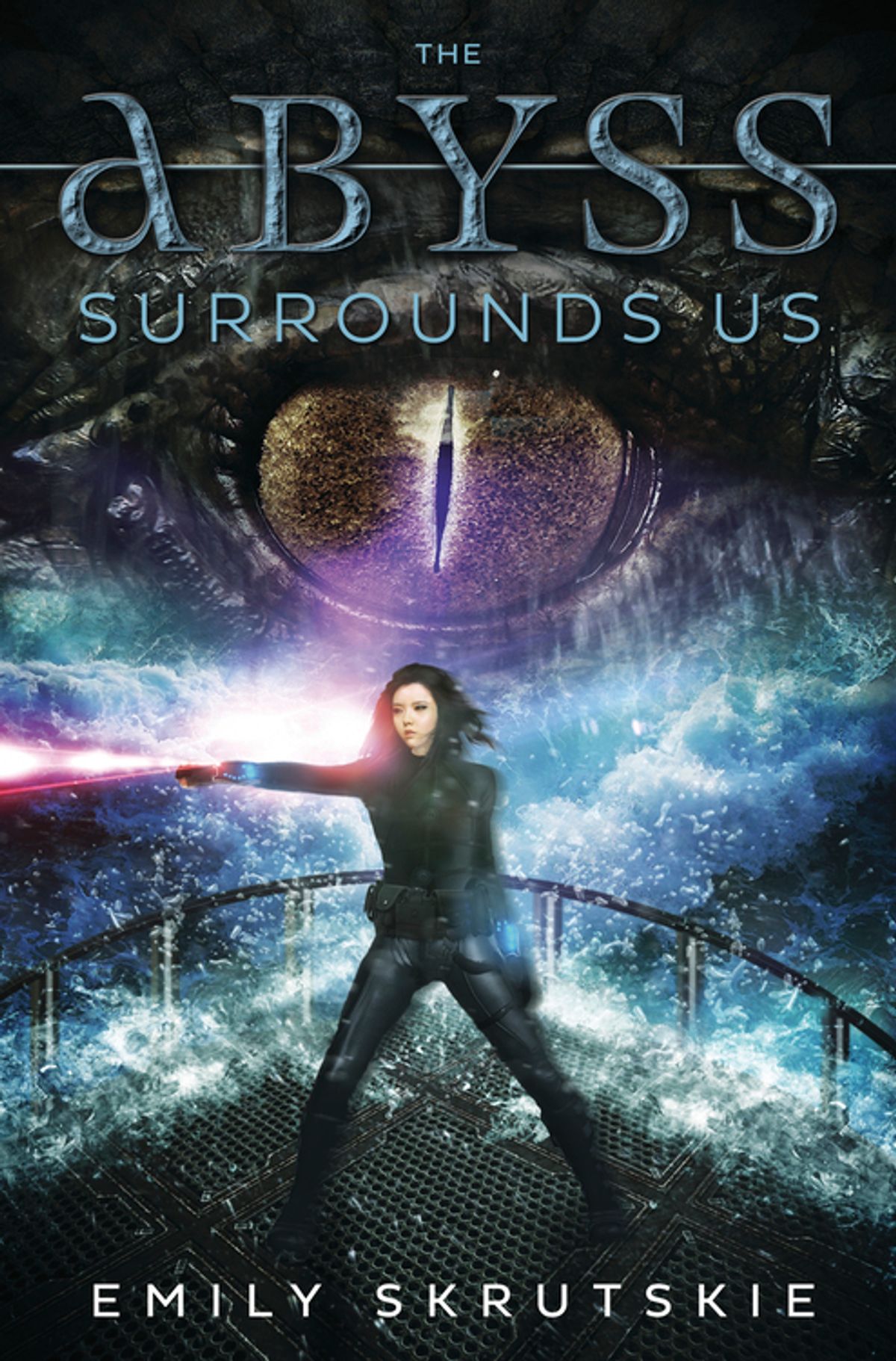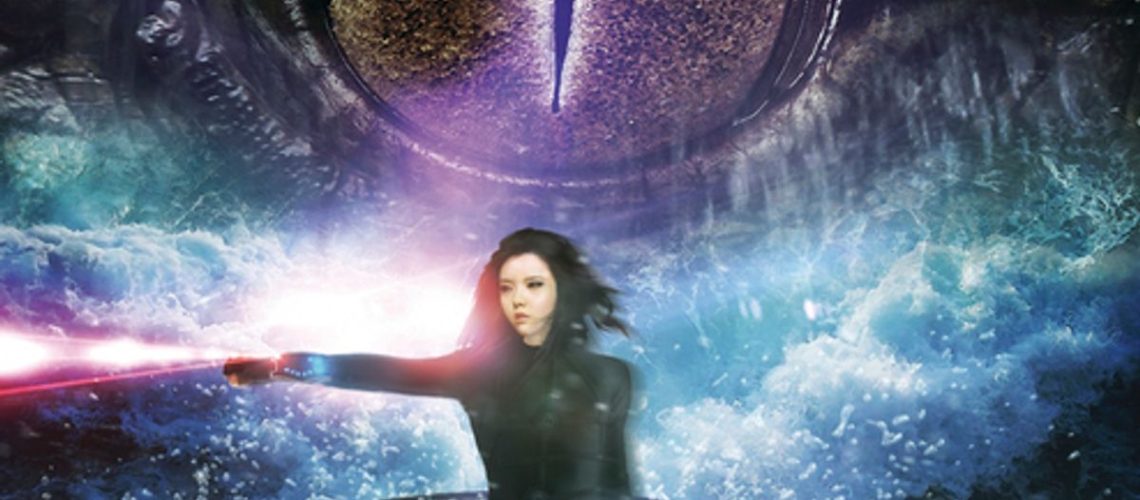Pride month might be over, but it’s never too late for lesbian pirates and kaiju. However, don’t expect fluffy YA romance from The Abyss Surrounds Us. This is a post-apocalyptic YA sci-fi that follows a tradition of tackling darker topics. Where The Hunger Games looks at living under an oppressive regime and In the Dark Spaces addresses being the sole survivor of a massacre, The Abyss Surrounds Us tells a tale of emotional manipulation and abuse.
It begins with climate change. The oceans have risen, the flood walls of New Orleans have fallen, and the governments of the world have split into smaller territories. Ostensibly, these splits were intended to make it easier to protect these smaller population clusters. However, some people always fall through the cracks, leading to a pirate problem in the NeoPacific.
Cassandra Leung is a teenager from the Southern Republic of California. Her family is part of the world’s solution to the plague of pirates. They breed and train Reckoners: giant, genetically-engineered sea creatures created to protect their bonded ship. The Reckoners have proved a very useful solution thus far, albeit one that relies on a delicate ecological balance. The creation of Reckoners is carefully monitored so that enough food can be engineered to feed these monsters without disrupting the rest of the ocean’s ecology. In order to preserve both this ecological balance and the political power balance, Reckoner handlers are expected to protect the secrets of their industry with their life, if necessary.

This puts Cass in a perilous position when her first excursion as a Reckoner handler goes horribly wrong. Her beloved Reckoner dies a slow and agonising death before Cassandra herself is captured by pirates. She must decide whether to face her own demise or capitulate to the pirates’ demands — and perhaps have a chance to discover who has betrayed her industry by giving the pirates the means to raise their own Reckoner.
The Abyss Surrounds Us is definitely aimed at the older end of the YA spectrum, with some crossover potential for an adult audience. There is some strong language, but it’s the grey morality that suggests it’s for older readers. Few of the characters are shown in black and white.
Swift is one of the clearest examples of this moral ambiguity. Cass develops a key relationship with the pirate girl who captures her. Swift is one of a number of protégées the pirate captain has taken under her wing. Having recognised Cass’s role as a Reckoner handler — and, hence, her value to the pirates — Swift is put in charge of both making sure Cass doesn’t escape and that she’s protected from Swift’s envious cohort. This is the opportunity of a lifetime for Swift — a chance to show the captain she’s leadership material — and she’s not going to let that slip away by appearing soft. Yet at the same time, it quickly becomes apparent that putting on such a fierce face comes at a cost. Bunking together (for protection, naturally) means that Cass gets to see another side of Swift: the side that’s just doing what she can to survive. Swift serves as a mirror to Cass, who is called on to do some horrific things in the name of her own survival as the book progresses.
Gradually, a romance develops between Swift and Cass. This had the potential to be disastrous, positioning Stockholm Syndrome as something romantic. Indeed, YA is full of such toxic messages, most notoriously in Stephanie Meyer’s Twilight but also more recently (and more deliberately) in A Court of Thorns and Roses by Sarah J. Maas. It’s also prevalent in any riff on Beauty and the Beast. However, The Abyss Surrounds Us handles this issue deftly by making Cass explicitly conscious of the power dynamics of the relationship. While she might be attracted to Swift, she refuses to act on it until the girls stand on equal footing. And Swift respects Cass’s decision. I found this particularly noteworthy in a book where the situation is dangerous and personal boundaries are frequently violated. It is an eloquent expression of Swift’s genuine feelings for Cass, as well as being an excellent portrayal of consent.
Indeed, although I would characterise the story as dark, there’s a delightful lack of sexual violence. This could perhaps be a genre consideration since such content would be inappropriate for a young adult audience. It could also be the presence of a strongly female cast. Either way, I feel it serves as a good role model for adult fantasy in particular. The Abyss Surrounds Us neatly illustrates the way a story doesn’t need sexual violence to feel dark.
Instead, we have Santa Elena, pirate captain of the Minnow. Like the very best monsters, she mostly lurks in the shadows, lashing out just enough to let you know she’s present and dangerous. A master of mind games, her abuse is mostly psychological, and she is skilled at manipulating Cass into acting against her principles. However, Santa Elena is also not adverse to a little strategic torture and killing. Skrutskie cleverly keeps most of it off screen, giving her antagonist space to loom large in the mind of the reader. There are also hints that there’s more to the captain than meets the eye. The Abyss Surrounds Us is the first in a duology, so I’d expect these hints play out in the second book. As it stands, they serve as indications that the captain too may stand further into morally grey territory than we might expect from her abusive behaviour.
So, we’ve had lesbians and we’ve had pirates. Which leaves the kaiju. The two Reckoners Cass handles are a study in contrast, despite being of a similar physical type. Durga is an older Reckoner, an experienced titan of the sea. Cass has grown up with her and knows every inch of her keratin shell, every routine grumble. She is part of the safety that is stripped away from Cass, paving the way for Bao.
All the relationships in this book are somewhat fraught, and Cass’s relationship with Bao is no exception. Not only is she forced into raising him, but she’s inexperienced, and he’s unexpectedly volatile. As such, he presents a physical danger to her. Given the circumstances, it’s unsurprising that Cass starts out resenting him, referring to him as “little shit.” In the back of her mind, she also thinks of him as a weapon, much as the pirates do — one she can potentially turn against her captors in order to gain freedom. But such a plan requires training, and that training requires time. And time brings a grudging affection, much like it does with Swift.
The book has a few weaknesses. The mystery of the industry leak is weak, not much more than an easily predictable excuse to get Cass to go along with the pirates. Also, although it’s clear that some thought has been given to the worldbuilding, it doesn’t hold up under scrutiny. As mentioned earlier in this review, a key premise of the story is the way in which production of Reckoners is kept limited in order to preserve the ocean’s ecology. It seems questionable to assert that humanity could maintain the ecological balance of so vast and inaccessible a place as an ocean, especially given this is a world recovering from an ecological apocalypse.
The writing style is wonderfully cinematic and does a good job of conveying the scale of the Reckoners. This is particularly the case in the climactic battle, a dramatic set piece that shows off both the power and variety of the different creatures. Paired as this is with a key emotional turning point for Cass, it makes a memorable scene.
So if you’re looking for a YA book with a Pacific Rim vibe, The Abyss Surrounds Us is the book for you.
The Abyss Surrounds Us was published in February 2016 by Flux. It is available where all good books are sold.







